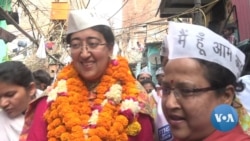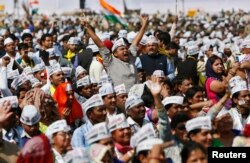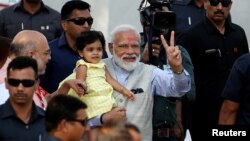Weaving through narrow alleys overflowing with water from clogged drains, Atishi Marlena promises voters in New Delhi that she will bring sanitation and clean drinking water to the low-income neighborhood in the Indian capital.
The 37-year-old Rhodes scholar plunged into politics after her work as an adviser with the Delhi government helped dramatically improve education standards in the city’s schools.
“I realized if you elect the right people into the right decision-making positions then it can have a substantial impact on the lives of people,” said Atishi who prefers to be called by her first name.
Ambitious party, short on cash
Born on an anti-corruption plank, her Aam Aadmi party is aiming for a larger footprint in national politics following a sweeping victory that handed it control of Delhi’s local government in 2015.
But the 6-year-old party lacks the deep pockets of mainstream political giants like the ruling Bharatiya Janata Party and the Congress Party. That has prompted Atishi to raise campaign money through crowdfunding on India’s first political crowdfunding platform, ourdemocracy.in.
It is a small but significant initiative in a country that is holding what could turn out to be the world’s most expensive election, according to surveys. India’s five-week staggered vote wraps up May 19.
Crowdfunding involves raising small amounts from many people and typically uses the internet to publicize the initiative. It usually is done for charitable causes, but politicians also are turning to it.
Estimated election cost: $8 billion
Estimates by the New Delhi-based Center for Media Studies peg the cost of the election at a record $8 billion, higher than the $5 billion spent in 2014 and surpassing the estimated $6.5 billion spent in the 2016 U.S. presidential and congressional elections.
A chunk of that money is being splurged on expensive election campaigns for which financing is opaque, according to independent watchdogs.
But as India becomes more digital, Bilal Zaidi, co founder of ourdemocracy.in, hopes that political financing can become more transparent and encourage newcomers to enter politics.
His startup is helping about 90 candidates — a small number out of the 8,000 in the fray for India’s parliament — raise funds through crowd funding. Two of them have grabbed national attention, although they are first-timers: Atishi and Kanhaiya Kumar, a fiery student leader who is contesting from Bihar.
New type of candidate
Both are new-age candidates from outside the entrenched political system. Atishi is widely seen as having the ability to steer change on the ground in areas such as health and education. Kumar, who was charged with sedition in 2016 for shouting anti-India slogans, is seen as a symbol of protest against what critics call the hyper-nationalist politics of Prime Minister Narendra Modi’s Bharatiya Janata Party.
They have raised about $100,000 each, the limit set by the Election Commission for campaign spending.
“This election has established that if you work over the last five years to build enough social and political capital online you can convert it into raising funds for yourself,” Zaidi said.
Much of it came from ordinary people: a rickshaw puller, students and middle level workers in denominations as little as $1.5.
“The feedback we got was that they felt that enough is enough, young people, people with clean backgrounds should be in politics, and if that starts happening they feel they will have a bigger say in the system,” he said.
More money, worse candidates
Activists have long called for steps to check the spiraling spending on campaigns that are mostly funded by big business. The $100,000 cap on candidates set by the Election Commission is widely breached, say observers, while there is no limit on what parties can spend.
N. Bhaskara Rao, director of the Center of Media Studies that has conducted several surveys of the cost of India’s polls, says the bill is soaring because of more inducements being offered to voters as contests become tighter.
“Earlier only the party in power used to pay, now most of the people are doing that,” Rao said.
Although it is illegal, it is a longstanding tradition to woo voters with freebies from cash and alcohol to other gifts. Authorities say in the last six weeks, they have seized goods and cash worth more than $456 million meant to bribe voters.
That is why Rao worries that the high price tag is not helping the country get better political representation.
“Each election you see the number of super rich and those with criminal backgrounds is increasing. So we are getting into flawed democracy scenario,” he said.
Almost all parties field candidates with pending criminal cases citing laws that they may be facing motivated charges and cannot be kept out until these are proved.
Political financing not so cleaned up
Although the BJP says that Modi’s government has heeded calls to clean up political financing, critics say the reforms initiated have worked in the opposite direction. Under new laws, companies no longer face a cap on donations and can fund parties anonymously through electoral bonds, essentially ensuring that ties between politicians and businessmen do not have to be disclosed. The BJP is believed to be the biggest beneficiary of electoral bonds: political observers say Modi is backed by large companies wary of a fragile coalition government coming to power.
“Electoral bonds have removed any shred of transparency that political financing had in India,” said Jagdeep Chhokar, a founder of the Delhi-based Association for Democratic Reforms. “They legitimize dubious donations.”
A return to small donations
As activists worry that high election expenditure fuels corruption, Zaidi hopes that smartphones in the hands of more than 400 million people could spark a small change and revive the system of tiny donations that once funded parties.
“Instead of say a set of 20 people sponsoring the entire political system, you can have 20 million people sponsoring the entire political system,” he said.
Atishi is optimistic that crowdfunding is the answer to clean up the political system.
“If you take money from big businesses, big corporations, you get elected into power, then you owe them a lot of favors,” she said. “Here the ordinary people have funded my election, so I can easily work in the interest of ordinary people.”
Whether she emerges victorious at the ballot box will only be known May 23, when votes are counted. It may not be easy. Her biggest opponent is a popular cricket star, Gautam Gambhir with the BJP.
But the hope is that if even one candidate backed by a crowd-funded campaign makes it to parliament, it would encourage more to tread the same path.

















